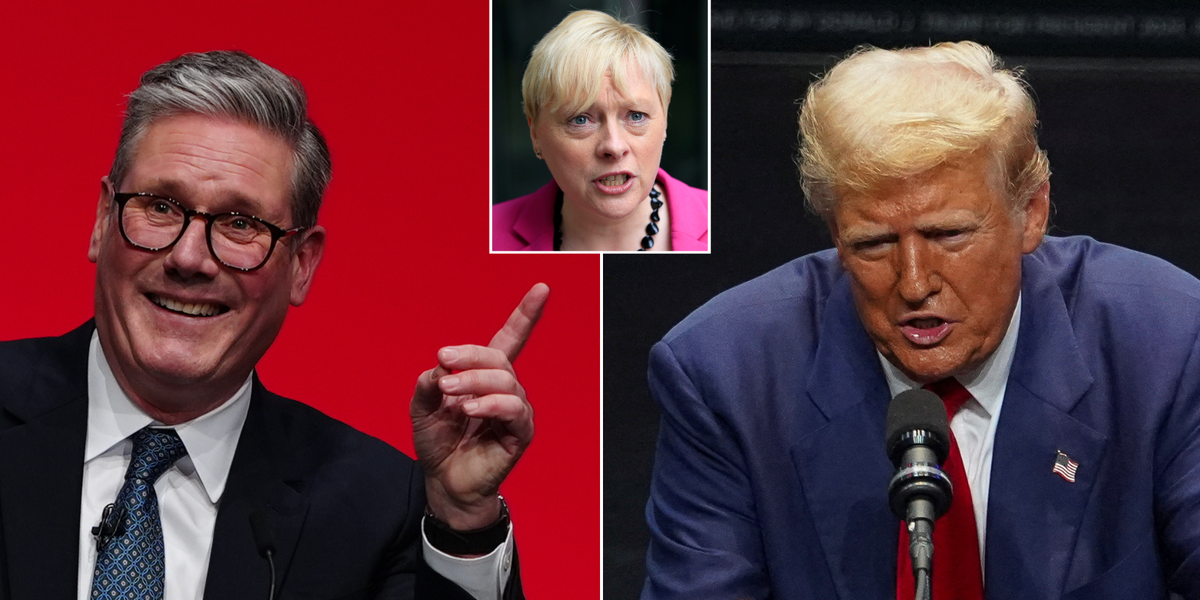The Transatlantic Tensions: Keir Starmer, Angela Eagle, and Donald Trump
In a politically charged atmosphere, the recent comments made by Home Office minister Angela Eagle at the Labour Party’s annual conference have ignited a transatlantic dialogue regarding immigration, racism, and the influence of political rhetoric. Eagle’s assertion that former President Donald Trump has emboldened racists in the UK has drawn attention, not only for its content but also for the responses it has elicited from various political figures, including Labour leader Sir Keir Starmer.
Angela Eagle’s Critique of Trump
During her speech at the Labour conference, Angela Eagle did not shy away from directly addressing Donald Trump. She articulated her concerns about the "toxic anti-immigration, anti-immigrant rhetoric" that has permeated not just the UK but also other Western nations. Eagle pointedly remarked, "Trump does the same," highlighting the parallels between his rhetoric and the growing hostility towards immigrants in Britain. She criticized the "astonishing" level of vitriol associated with Trump’s messaging, particularly referencing his infamous wall memes, which have become symbolic of his hardline stance on immigration.
Eagle’s comments reflect a broader concern among many politicians and activists about the normalization of hate speech and its potential consequences for societal cohesion. By linking Trump’s rhetoric to the challenges faced by new immigrants in the UK, Eagle aimed to underscore the need for a more compassionate and constructive dialogue about immigration.
Trump’s Response: A Dismissive Retort
In response to Eagle’s remarks, Trump’s campaign spokesman, Steven Cheung, offered a dismissive critique, questioning Eagle’s significance and relevance. "Nobody knows who this random person is – or cares what comes out of her mouth," Cheung stated, effectively attempting to undermine Eagle’s position and the legitimacy of her concerns. This reaction is emblematic of Trump’s broader strategy of dismissing critics, often by questioning their credibility or public standing.
Cheung’s comments also reflect a common tactic used by political figures to deflect criticism: by focusing on the critic rather than the criticism itself, they aim to shift the narrative and avoid engaging with the substantive issues raised.
Keir Starmer’s Diplomatic Stance
Amidst the escalating tensions, Sir Keir Starmer has opted for a more measured approach. When asked about Eagle’s comments and whether he agreed with her assessment of Trump, Starmer refrained from directly engaging in the spat. Instead, he emphasized the need to focus on the individuals responsible for any disorder on the streets, stating, "It lies with the thugs who were carrying out that disorder."
Starmer’s response highlights his attempt to navigate the complex landscape of immigration discourse in the UK. He acknowledged the genuine concerns many people have about immigration while simultaneously condemning the actions of those who resort to violence and disorder. By distinguishing between legitimate concerns and the actions of extremists, Starmer aims to foster a more nuanced conversation about immigration, one that recognizes the diversity of opinions and experiences within the community.
The Broader Implications
The exchange between Eagle, Trump, and Starmer underscores the increasingly polarized nature of political discourse surrounding immigration and race. As political leaders grapple with the implications of their rhetoric, the challenge remains to strike a balance between addressing legitimate concerns and preventing the normalization of hate speech.
Eagle’s comments serve as a reminder of the potential consequences of inflammatory rhetoric, while Starmer’s diplomatic approach highlights the importance of fostering constructive dialogue. In an era where political divisions seem to be deepening, the ability to engage in meaningful conversations about immigration and race is more crucial than ever.
Conclusion
The transatlantic spat involving Angela Eagle, Donald Trump, and Keir Starmer reflects broader societal tensions regarding immigration and racism. As political leaders navigate these complex issues, the need for thoughtful and respectful dialogue becomes paramount. The responses from Eagle, Trump, and Starmer illustrate the varying approaches to addressing these challenges, each with its implications for the future of political discourse in both the UK and the United States. As the conversation continues, it remains to be seen how these dynamics will evolve and what impact they will have on public sentiment and policy.
